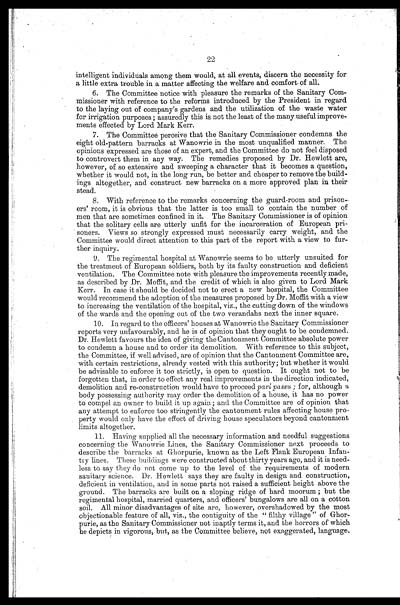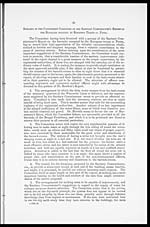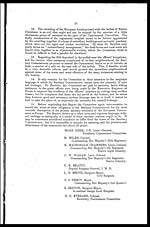Medicine - Institutions > Army health reports and medical documents > Reports on military cantonments and civil stations in the Presidency of Bombay inspected by the Sanitary Commissioner in the years 1875 and 1876 > Part I [i.e. 1] - Reports on military cantonments inspected in 1876
(225) Page 22
Download files
Individual page:
Thumbnail gallery: Grid view | List view

22
intelligent individuals among them would, at all events, discern the necessity for
a little extra trouble in a matter affecting the welfare and comfort of all.
6. The Committee notice with pleasure the remarks of the Sanitary Com-
missioner with reference to the reforms introduced by the President in regard
to the laying out of company's gardens and the utilization of the waste water
for irrigation purposes; assuredly this is not the least of the many useful improve-
ments effected by Lord Mark Kerr.
7. The Committee perceive that the Sanitary Commissioner condemns the
eight old-pattern barracks at Wanowrie in the most unqualified manner. The
opinions expressed are those of an expert, and the Committee do not feel disposed
to controvert them in any way. The remedies proposed by Dr. Hewlett are,
however, of so extensive and sweeping a character that it becomes a question,
whether it would not, in the long run, be better and cheaper to remove the build-
ings altogether, and construct new barracks on a more approved plan in their
stead.
8. With reference to the remarks concerning the guard-room and prison-
ers' room, it is obvious that the latter is too small to contain the number of
men that are sometimes confined in it. The Sanitary Commissioner is of opinion
that the solitary cells are utterly unfit for the incarceration of European pri-
soners. Views so strongly expressed must necessarily carry weight, and the
Committee would direct attention to this part of the report with a view to fur-
ther inquiry.
9. The regimental hospital at Wanowrie seems to be utterly unsuited for
the treatment of European soldiers, both by its faulty construction and deficient
ventilation. The Committee note With pleasure the improvements recently made,
as described by Dr. Moffit, and the credit of which is also given to Lord Mark
Kerr. In case it should be decided not to erect a new hospital, the Committee
would recommend the adoption of the measures proposed by Dr. Soffit with a view
to increasing the ventilation of the hospital, viz., the cutting down of the windows
of the wards and the opening out of the two verandahs next the inner square.
10. In regard to the officers' houses at Wanowrie the Sanitary Commissioner
reports very unfavourably, and he is of opinion that they ought to be condemned.
Dr. Hewlett favours the idea of giving the Cantonment Committee absolute power
to condemn a house and to order its demolition. With reference to this subject,
the Committee, if well advised, are of opinion that the Cantonment Committee are,
with certain restrictions, already vested with this authority; but whether it would
be advisable to enforce it too strictly, is open to question. It ought not to be
forgotten that, in order to effect any real improvements in the direction indicated,
demolition and re-construction would have to proceed pari passu; for, although a
body possessing authority may order the demolition of a house, it has no power
to compel an owner to build it up again; and the Committee are of opinion that
any attempt to enforce too stringently the cantonment rules affecting house pro-
perty would only have the effect of driving house speculators beyond cantonment
limits altogether.
11. Having supplied all the necessary information and needful suggestions
concerning the Wanowrie Lines, the Sanitary Commissioner next proceeds to
describe the barracks at Gthorpurie, known as the Left Flank European Infan-
try lines. These buildings were constructed about thirty years ago, and it is need-
less to say they do not come up to the level of the requirements of modern
sanitary science. Dr. Hewlett says they are faulty in design and construction,
deficient in ventilation, and in some parts not raised a sufficient height above the
ground. The barracks are built on a sloping ridge of hard moorum; but the
regimental hospital, married quarters, and officers' bungalows are all on a cotton
soil. All minor disadvantages of site are, however, overshadowed by the most
objectionable feature of all, viz., the contiguity of the "filthy village" of Ghor-
purie, as the Sanitary Commissioner not inaptly terms it, and the horrors of which
he depicts in vigorous, but, as the Committee believe, not exaggerated, language.
Set display mode to: Large image | Zoom image | Transcription
Images and transcriptions on this page, including medium image downloads, may be used under the Creative Commons Attribution 4.0 International Licence unless otherwise stated. ![]()
| Permanent URL | https://digital.nls.uk/75009207 |
|---|




